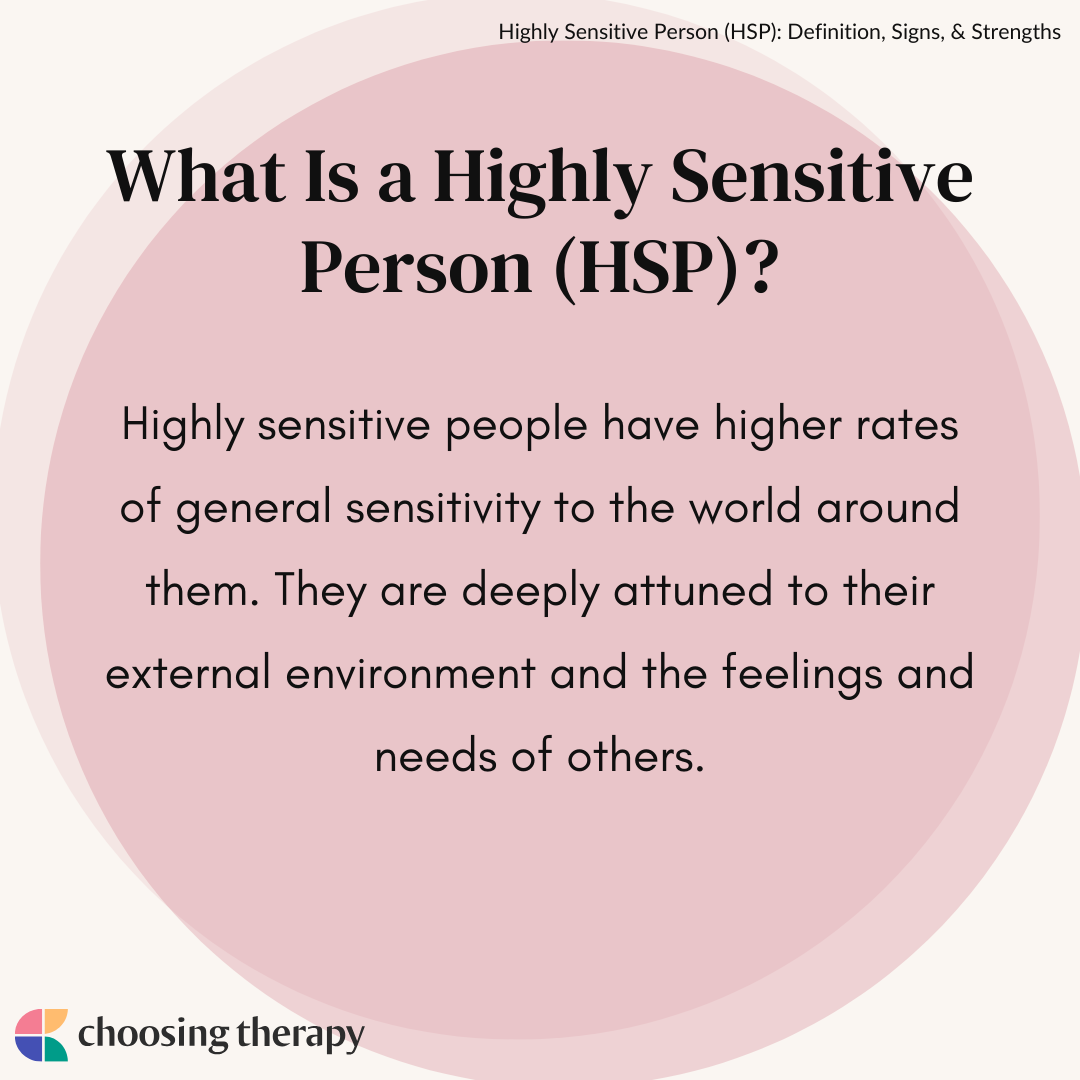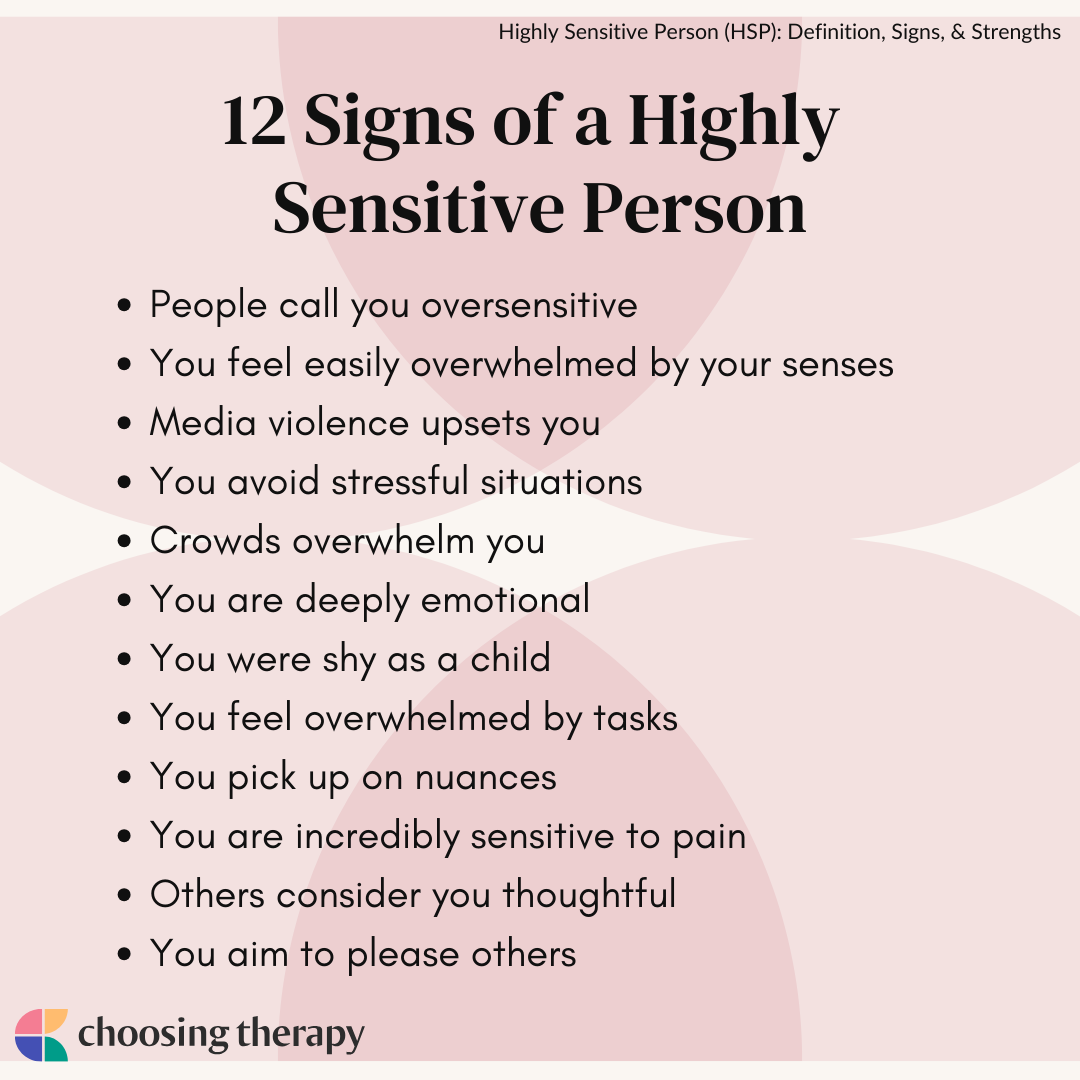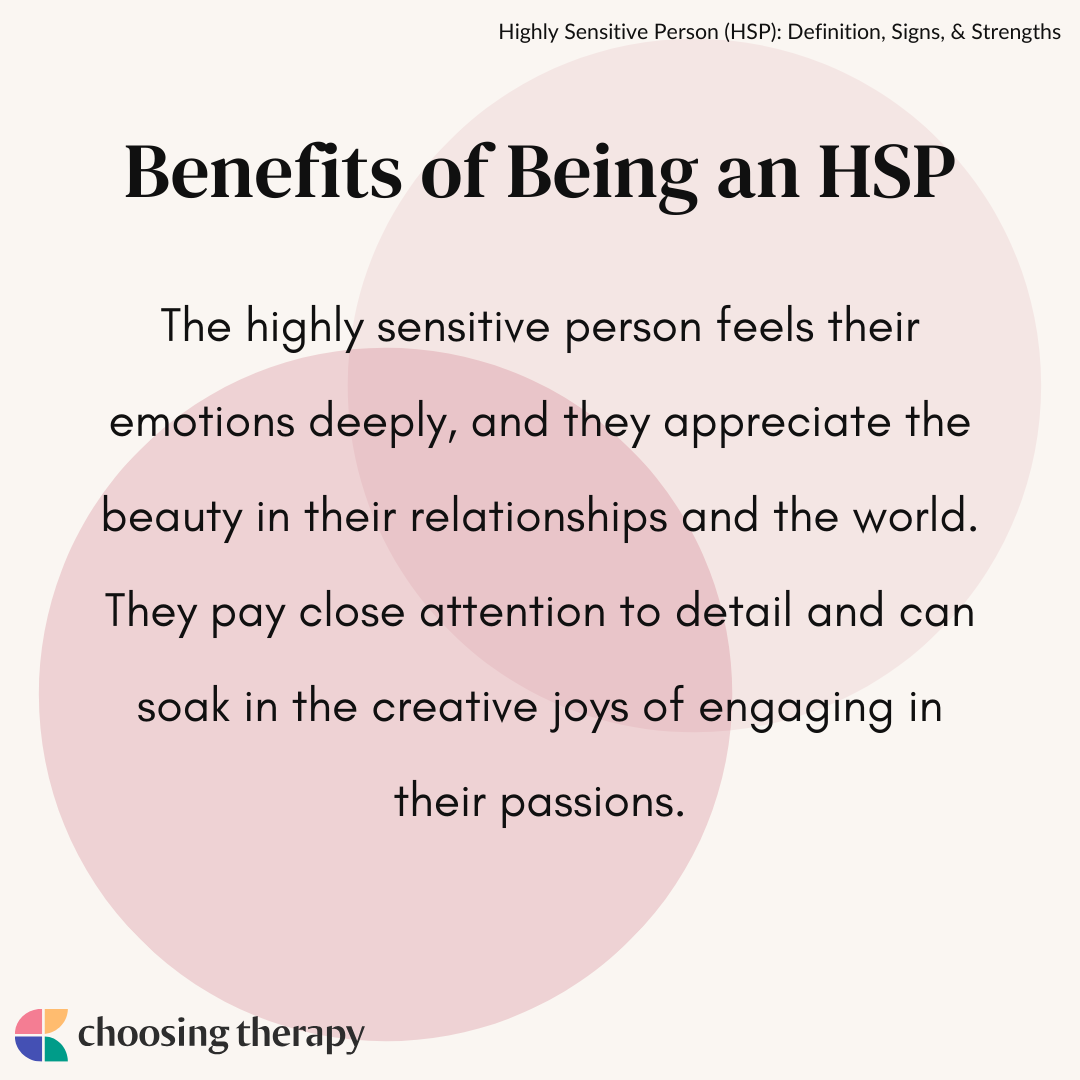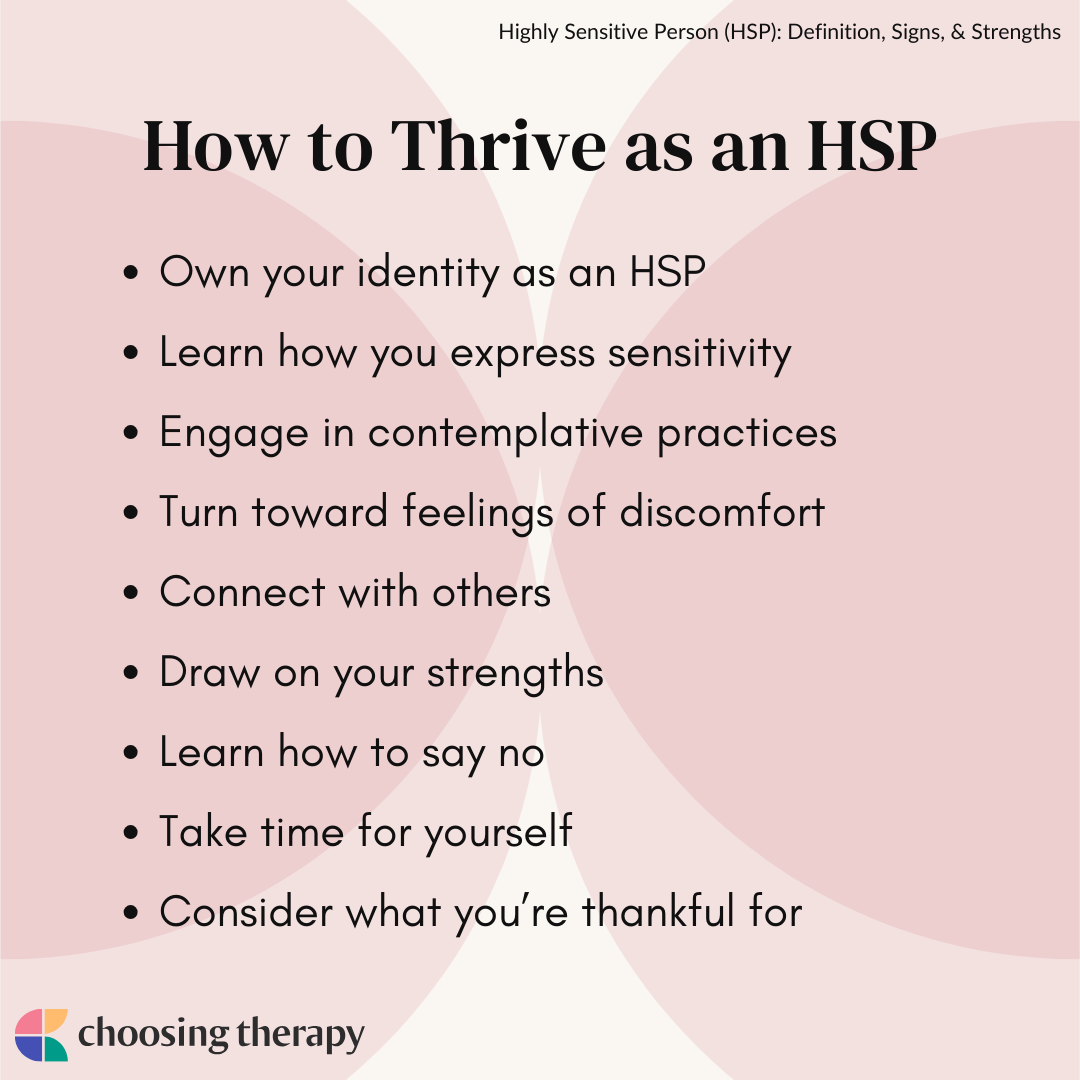Highly sensitive persons (HSP) are ultra-aware of sensory input, other people, and their environment. Heightened sensitivity is a personality trait often resulting in increased conscientiousness, meticulousness, and empathy. For some, seeking mental health support can help HSPs develop coping skills, maintain appropriate boundaries, navigate relationships, and build strengths.
A therapist can help you build confidence and self-esteem.
BetterHelp has over 20,000 licensed therapists who provide convenient and affordable online therapy. BetterHelp starts at $65 per week. Take a Free Online Assessment and get matched with the right therapist for you.
What Is a Highly Sensitive Person (HSP)?
Highly sensitive people (sometimes known as hyper-sensitive people) have higher rates of general sensitivity to the world around them. They are deeply attuned to their external environment and the feelings and needs of others. A highly sensitive person may appear to be overly sensitive during childhood, which can be confusing or even frustrating for caregivers. Such sensitive traits tend to persist over a lifetime.
Highly sensitive person traits may include:
- Sensitivity to lights and sounds
- Sensitivity to caffeine and medications
- Feelings of being overwhelmed by crowded places
- Feeling more drained than others after spending time with people
- Affected by the energy and moods of the people around them
- Startling easily
- Difficulty with transitions and change
- Avoiding violence in television and movies
How Common Are HSPs?
Research suggests HSPs account for 15-20% of the population.1 High sensitivity also appears to occur equally across the gender spectrum. However, being an HSP can be vastly misunderstood depending on the culture. For example, some cultures view sensitivity as valuable and understanding. On the other hand, many Americans devalue and pathologize hyper or “overly” sensitive traits.
12 Signs of a Highly Sensitive Person
Highly sensitive people have different characteristics with varying nuance, but commonalities include deeply and intensely experiencing the world. Many HSPs believe they “think too much,” often feeling overwhelmed by every minute detail.
Here are 12 signs that you might be an HSP:
- People call you oversensitive: This is the hallmark characteristic of an HSP. HSPs tend to be much more sensitive than those around them.
- You feel easily overwhelmed by your senses: HSPs typically experience overstimulation from at least one of the five senses. Other HSPs may feel overstimulated by all five senses.
- Media violence upsets you: HSPs are highly empathic, so any display of violence in the media can be extremely upsetting. As a result, you may avoid watching horror movies, torture scenes, or even the news.
- You avoid stressful situations: Many HSPs avoid stressful or overwhelming situations. This behavior may be unconscious or purposeful.
- Crowds overwhelm you: Large groups of people often overwhelm HSPs. Crowds may make you withdraw or shut down entirely, partly because of the sensory stimulation and the emotional energy you absorb from others.
- You are deeply emotional: HSPs connect strongly with emotions because their brains process things more intensely. You may be an HSP if you spend a lot of time and energy contemplating or cultivating your internal world.
- You were shy as a child: Many adult highly sensitive people report others labeling them as “shy” or “withdrawn” as children.
- You feel overwhelmed by tasks: A to-do list can overstimulate HSPs, possibly because HSPs go to great lengths to avoid making mistakes or upsetting others.
- You pick up on nuances: HSPs are adept at catching subtleties in the environment, art, and emotional reactions of those around them. The high sensitivity characteristic of HSPs enables you to notice things others may miss.
- You are incredibly sensitive to pain: Increased pain sensitivity is common among HSPs. Again, this relates to heightened sensory sensitivity and brain processing.
- Others consider you thoughtful: You are likely an HSP if people consistently remark on your thoughtfulness. HSPs are detail-oriented and pick up on things others may not notice or remember.
- You aim to please others: HSPs avoid upsetting others or making mistakes. As an HSP, disruption in your environment—including the people around you—can be extremely distressing and uncomfortable.
Getting Therapy Is Affordable!
BetterHelp – Online Therapy Starting At $65 Per Week
“BetterHelp is an online therapy platform that quickly connects you with a licensed counselor or therapist and earned 4 out of 5 stars.” Visit BetterHelp
Talkspace - Online Therapy With or Without Insurance
Talkspace accepts many insurance plans including Optum, Cigna, and Aetna. Typical co-pay is $30, but often less. Visit Talkspace
What Causes High Sensitivity?
Experts are unsure what exactly causes emotional hypersensitivity. Highly sensitive traits may be hereditary or coincide with other characteristics, including introversion. With that said, high sensitivity likely comes from various factors, including environment, genetic predisposition, early childhood experiences, and individual temperament.2
Possible causes of high sensitivity include:
- Genetic factors: Genetics may correlate with high sensitivity. Research has shown that HSPs may respond differently to dopamine receptors.
- Lack of parental warmth: Research also shows that parental warmth is essential for personality development. Feeling unloved or neglected by early caregivers may be associated with a higher likelihood of sensitivity.
- Childhood trauma: Childhood trauma can fundamentally impact how people respond to themselves and the world. These experiences may correlate with high sensitivity.
Benefits of Being an HSP
Heightened sensitivity is not bad, and many HSPs appreciate their complex and compassionate personalities. The highly sensitive person feels their emotions deeply, and they appreciate the beauty in their relationships and the world. They pay close attention to detail and can soak in the creative joys of engaging in their passions.
Below are possible strengths of HSPs:
- High levels of empathy: HSPs are often very understanding and nurturing and strive to connect with loved ones.
- Experiencing pleasure: HSPs are more sensitive to pain, which paradoxically means also being more sensitive to enjoying pleasure.
- More creativity: Sensitive people can tap into their inner world and perceptive skills to channel greater creativity.
- Improved self-care: Many HSPs are deeply attuned to their own feelings and needs, which means they may be more apt to practice self-care when overwhelmed or tired.
- Strong intuition: HSPs have excellent decision-making skills, allowing them to hone in their environments with increased intuition.
Potential Challenges For HSPs
Highly sensitive persons possess many valuable traits. However, being an HSP also comes with challenges, such as being easily stressed, overstimulated, or self-loathing.
Potential challenges of being an HSP include:
- Being easily stressed by conflict: HSPs usually shy from overwhelming stimuli like stressful conflicts or confrontations. They may avoid conflict altogether, sometimes leaving them constantly keeping the peace and limiting self-expression.
- Being unable to avoid overstimulation: We only have so much control over our environment. Americans favor “bigger,” “louder,” and “brighter” things, and this can overwhelm HSPs. You may feel as though you are “high-maintenance.” Advocating for yourself can seem challenging or even embarrassing, especially as a people-pleaser.
- Comparing yourself to others: HSPs may feel frustrated that others appear more resilient or “go with the flow.” They might feel inadequate as a result of this comparison.
- Low toleration threshold: HSPs struggle with pain and difficult emotions. They often have a weaker tolerance for life’s ebbs and flows because they feel physical and emotional sensations deeply.
- Intense self-criticism: Sensitivity may go hand-in-hand with greater self-loathing, especially if family members or others criticize their sensitivity.
Would like to feel less self-critical?
Therapy can help. BetterHelp has over 20,000 licensed therapists who provide convenient and affordable online therapy. BetterHelp starts at $65 per week. Take a Free Online Assessment and get matched with the right therapist for you.
Similar HSP Conditions & Traits
HSP characteristics sometimes mirror symptoms of other conditions. Some symptoms will overlap, whereas others will have slight and subtle differences. Understanding these similarities and differences can aid in receiving a specific diagnosis or seeking a formal assessment.
Below are conditions and traits similar to high sensitivity:
- Attention-deficit/hyperactivity disorder (ADHD): HSP may be mistaken for ADHD because people with both conditions experience heightened reactivity when overstimulated. However, someone with ADHD has marked concentration and focus difficulties, whereas an HSP does not.
- Autism: HSP can be mistaken for autism, but autistic people tend to be either hypersensitive or hyposensitive to their external environment. They also have social difficulties and rigid behaviors that transcend sensitivity.
- Introversion: Introverts may feel overwhelmed by high levels of stimulation, but sensitivity is exclusive to social settings. An HSP experiences sensitivity across various situations.
- Sensory processing disorder (SPD): HSPs experience heightened sensory experiences, whereas someone with SPD often consistently struggles with sensitive triggers that affect their ability to function in daily life. Someone with SPD may have trouble executing specific tasks.
How to Thrive as an HSP
High sensitivity can be a superpower. HSPs enjoy a deeper sense of meaning and fulfillment with themselves and others, even though they live in societies that do not always embrace these traits. They know when to slow down and ensure their environment feels safe.
Below are ways to cope as a highly sensitive person:
Own Your Identity as an HSP
Recognizing high sensitivity as a personality trait is key to thriving as an HSP. Part of this is acknowledging that being highly sensitive does not mean anything is wrong with you. Heightened sensitivity is just a part of your identity.
Learn How You Express Sensitivity
While many general qualities and traits are associated with being an HSP, your experience is unique. For example, you may have an incredible sense of hearing, while another HSP is more affected by smells. Learning more about yourself can help cultivate your identity as an HSP.
Engage in Contemplative Practice
Whether through mindfulness, meditation, or body scans, creating a contemplative practice as an HSP is essential. These practices provide opportunities to check in with your body and learn more about your experience. You can use this awareness to make choices best suited for you.
Turn Toward Feelings of Discomfort
Many HSPs often avoid the discomfort of negative or activating emotions. However, avoidance behavior creates a depleting cycle. Learning to embrace and reframe discomfort as part of your experience can help you process these feelings and create space for joyful emotions.
Connect With Others
Engaging with people who are or understand HSPs can be validating, further cultivating your resilience. Connecting with other HSPs, joining support groups, or working with a therapist specializing in high sensitivity can be great avenues to explore.
Draw on Your Strengths
Many HSPs have deep experiences with art, music, and nature. This appreciation for nuance and imagination can be important coping mechanisms. They can also act as assets in building resilience.
Learn How to Say No
Establishing reasonable and healthy boundaries for yourself is important as an HSP. HSPs can become quickly overstimulated, so consider where you need to implement limits. What draining activities can you avoid or potentially eliminate? Which situations leave you feeling poorly? Answering these questions can help you determine where and when to enact boundaries.
Take Time for Yourself
HSPs thrive when they can relish in solitude. Spending time alone differs from isolation, particularly when caring for your needs. Self-care comes in many forms but can include engaging in enjoyable hobbies, being physically active, journaling, or simply getting some rest. These activities help you build a better relationship with yourself.
Consider What You’re Thankful For
Occasional frustration with your HSP traits is normal. Consider pausing and reflecting on your appreciation when stuck in a downward spiral. Where can you find gratitude? What’s going well in your life? Consider implementing a daily gratitude practice to acknowledge the best parts of your day each night.
When to Seek Professional Help
Sometimes high sensitivity results in mental health problems, including depression and anxiety disorders. HSP traits can also coincide with compulsive issues such as substance use, disordered eating, or problematic sexual behaviors.
Consider seeking professional support if you struggle with your sensitivity. A therapist can help you better understand your emotional triggers and teach you adaptive ways to cope with your distress. You can find and choose a therapist, counselor, or psychologist in an online therapist directory.
Betterhelp – Affordable, convenient, online therapy – Get 20% Off Your First Month
Final Thoughts
You are not alone in being unsure how to utilize your potential as an HSP. Talking to a therapist, trusted friend, or family member can be beneficial. Consider seeking professional support if you struggle to cope as an HSP.
Additional Resources
To help our readers take the next step in their mental health journey, Choosing Therapy has partnered with leaders in mental health and wellness. Choosing Therapy is compensated for marketing by the companies included below.
Online Therapy
BetterHelp Get support and guidance from a licensed therapist. BetterHelp has over 20,000 therapists who provide convenient and affordable online therapy. Complete a brief questionnaire and get matched with the right therapist for you. Get Started
Virtual Psychiatry
Hims / Hers If you’re living with anxiety or depression, finding the right medication match may make all the difference. Connect with a licensed healthcare provider in just 12 – 48 hours. Explore FDA-approved treatment options and get free shipping, if prescribed. No insurance required. Get Started
Reduce Drinking
Sunnyside Want to drink less? Sunnyside helps you ease into mindful drinking at your own pace. Think lifestyle change, not a fad diet. Develop new daily routines, so you maintain your new habits for life. Take a 3 Minute Quiz
Mental Health Newsletter
A free newsletter from Choosing Therapy for those interested in mental health issues and fighting the stigma. Get helpful tips and the latest information. Sign Up
Online Anxiety Test A few questions from Talkiatry can help you understand your symptoms and give you a recommendation for what to do next. How Does ERP Help With Intrusive Thoughts? Obsessive compulsive disorder (OCD) is a psychiatric condition marked by the presence of obsessive thoughts, images, doubts, or urges, followed by compulsive behaviors or acts aimed at easing the distress caused by the obsession. While the content of the obsessions can take many forms, they are always repetitive, persistent, involuntary, and intrusive, and they often result in a great deal of anxiety for the person experiencing them.








